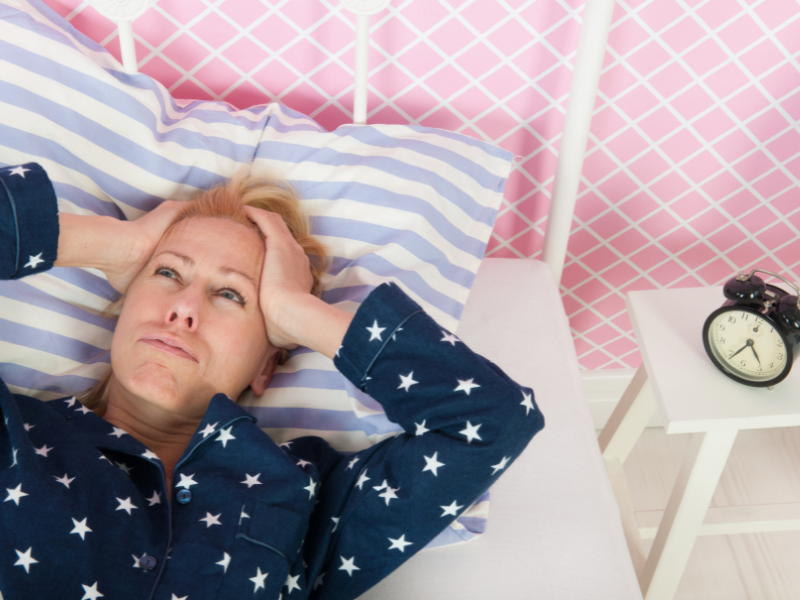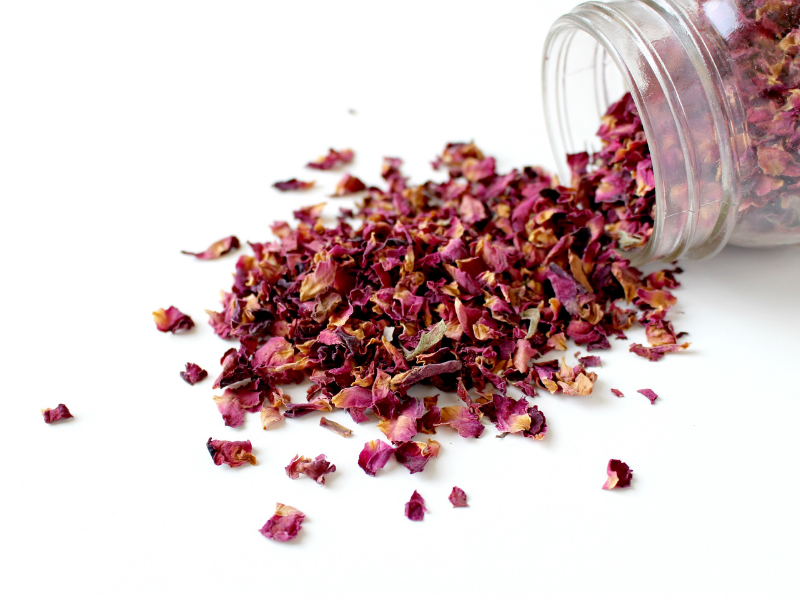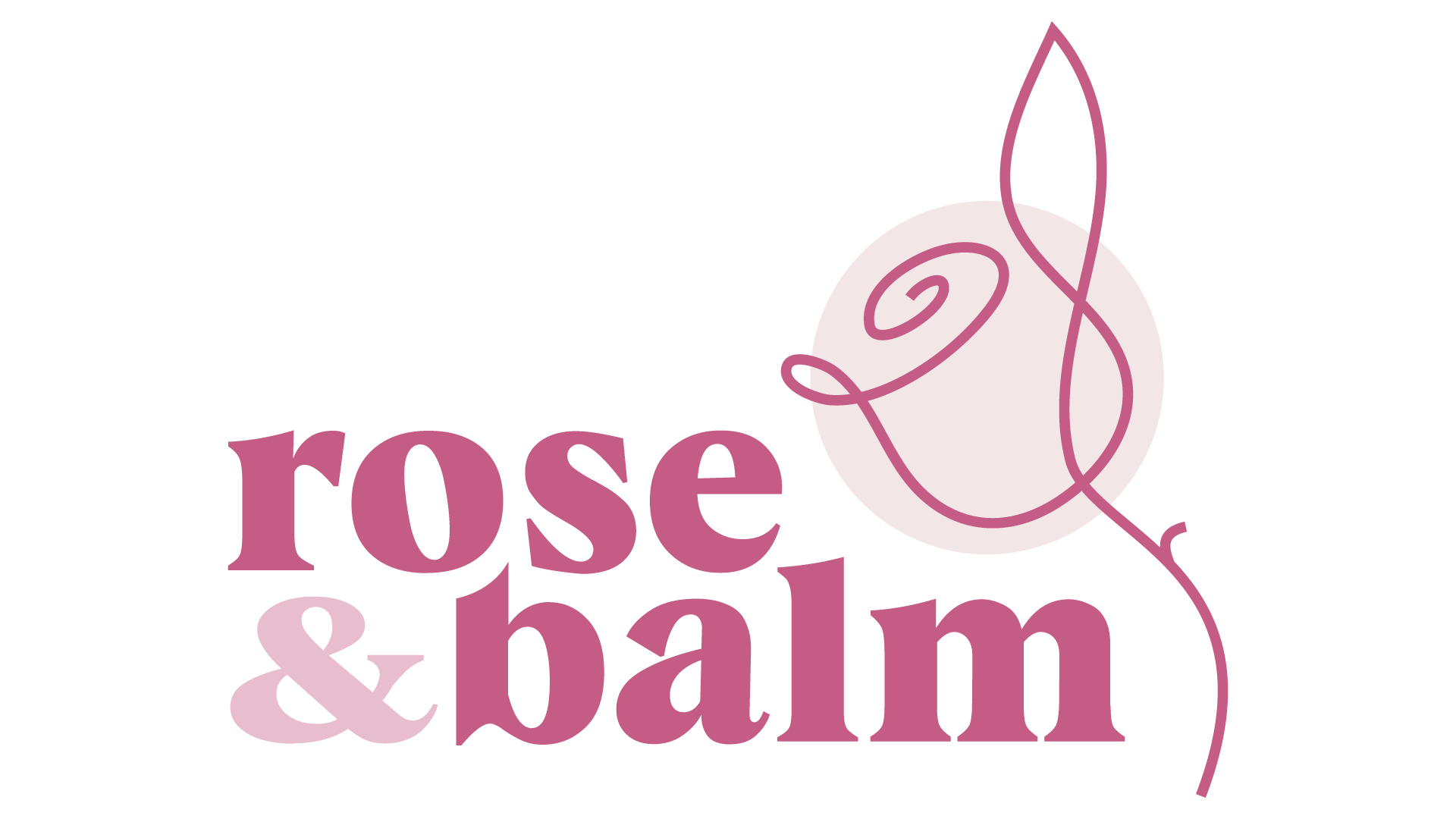Introduction
Have you noticed that you are feeling more tired than usual lately? For women in their forties, this fatigue may be due to perimenopause. Read on to find out which are the best herbs to overcome perimenopause fatigue.
For lifestyle and dietary tips to help please read How to Increase Energy and Overcome Fatigue During Perimenopause.
What Causes Fatigue During Perimenopause?
There are three main factors which can cause, or worsen, fatigue during perimenopause. These are:
- Insomnia and sleep disturbance
- Stress and anxiety
- Hormonal changes

Herbs for Insomnia and Sleep Disturbance
Let’s take a look at three herbal remedies that are helpful for sleep problems.
Use herbal sleep remedies just for short periods of time. Consult a Medical Herbalist if you require ongoing treatment. If you suffer from depression or anxiety, please seek professional treatment.
Herbal sleep remedies are best taken as tinctures, capsules, or tablets, rather than teas. Drinking herbal tea before bed may mean you wake during the night needing to pee!
Valerian
Valerian (Valeriana officinalis) is an excellent herb that is both a mild sedative and hypnotic. Hypnotics are herbs that we use for sleep. Valerian helps whenever you feel tense or anxious. Use it for all types of insomnia. It is excellent when you cannot get to sleep because your mind is racing.
You can find valerian in capsule form, an alcohol tincture, or use the dried root. Use on its own or blend with other herbs. To use the dried root you will need to simmer it for 10 minutes, strain, and drink once cooled.
Some people are sensitive to valerian and can find it stimulating. Avoid whilst breast feeding or in depression.
Passion Flower
Passion flower (Passiflora incarnata) is a beautiful ornamental flower that is relaxing and mildly sedating. Similar to valerian, it helps with anxiety, tension, and insomnia. Use it singly or blend it with other herbs. Passion flower blends well with valerian. It is excellent for frequent waking through the night.
Find in capsule form, an alcohol tincture, or use the dried plant. The dried plant can be made into a herbal tea. Steep 1 teaspoon of herb per cup of boiling water for 10 minutes. Strain and drink once cooled.
Hops
Hops (Humulus lupulus) is a hypnotic and anti-anxiety herb. It also contains phytoestrogens. Phytoestrogens are plants that contain oestrogen-like plant chemicals. Hops are thus particularly useful for insomnia due to perimenopause or menopause. These oestrogen-like plant chemicals cans help with hormonal balance. This also helps to reduce hot sweats during the night.
Find hops as an alcohol tincture, or use the dried herb. Do not use hops if you have a low mood or depression. Avoid whilst breast feeding.
Stress and Anxiety
All the herbs used for insomnia can also help with anxiety and tension. For stress, try relaxing herbs, nervine tonics, and adaptogens. Nervine tonics and adaptogens increase your resilience to stress. For more tips on managing stress see My Absolute Top 5 Easy Ways to Empower You to Beat Stress Naturally.
Skullcap
Skullcap (Scutellaria lateriflora) is a relaxing nervine tonic. It is particularly helpful when you have been working too hard. Use to help with feelings of stress and overwhelm. It usually needs to be used alongside other herbs. It works very well with valerian.
Take the alcohol tincture, or use make a tea from the dried herb. Make sure you purchase from a reliable source to be sure you get the correct species. Other, cheaper species are sometimes sold in its place by unscrupulous suppliers.
Ashwagandha
Ashwagandha (Withania somnifera) is an adaptogen and a nervine tonic. It is perfect where there is exhaustion due to stress and worry. Unlike most adaptogen herbs, it is not too stimulating. It is ideal for menopausal brain fog. Take as a single herb or blend it with others.
Take the capsules, alcohol tincture, or make a tea from the dried herb. Ashwagandha can cause stomach irritation so stick to recommended doses and avoid if you have any gastrointestinal disease.
Rose
Rose (Rosa damascena) is a mild nerve tonic and herbal relaxant. It is lovely and cooling and helps with hot flushes. Hot flushes are often worse when you are feeling anxious. Rose is a herb that is ideal to use during perimenopause. It tastes a little strong on its own but blends very well with lavender and lemon balm to make a delicious herbal tea.
You can find rose as a tincture or use the dried petals to make a tea. Avoid during pregnancy.
Hormonal Changes
Adjusting your diet is an excellent way to support your hormones during perimenopause. Include plenty of phytoestrogen foods (pulses, nuts, and seeds) before and after menopause. Some herbal remedies can help with balancing hormones too.
Shatavari
Shatavari (Asparagus racemosus) is an Indian herb used in Ayurvedic medicine. It contains steroidal saponins that have hormonal actions. Shatavari is cooling and moistening. Herbalists use it to help improve libido and vaginal dryness around menopause. It is also a nervine tonic and an adaptogen.
Take as capsules, tincture, or use the dried herb to make a tea.
Sage
Sage (Salvia officinalis) is a phytoestrogen used for hot flushes and night sweats. It is best taken as tea, but you may find it in many formulas. Drink the cooling tea to help manage hot flushes and night sweats. Night sweats are a common cause of sleep disturbance during perimenopause. You can read more in ‘how to manage night sweats and hot flushes during menopause.
Sage contains thujone which is toxic in excess. Thujone does not extract well into water. Therefore, the tea will contain less than the tincture. You can have up to three cups of sage tea per day. Only use the tincture for short periods of time.
Do not take during pregnancy or whilst breast feeding. Avoid in epilepsy.
Summary
Fatigue during perimenopause is common. It affects approximately half of women during this period. The fatigue is due to hormonal changes and is made worse by stress, anxiety, and insomnia. Several lifestyle and dietary changes can help. Herbal remedies can also support women who struggle with fatigue around menopause.
Never assume that fatigue is due to perimenopause. All fatigue needs to be assessed by your GP. Rarely, fatigue may indicate serious disease.
Cautions
Consult your Medical Herbalist, GP or pharmacist before using herbs if you:
- Take any medication
- Have a medical condition
- Are pregnant or breastfeeding
If you are struggling with anxiety, depression or stress, please seek advice from a medical professional. It is best to not try and deal with these difficulties alone.
If you would like to find out more about a herbal consultation please book your free discovery call here.
Disclaimer
This article does not substitute for professional medical advice or treatment.


Recent Comments